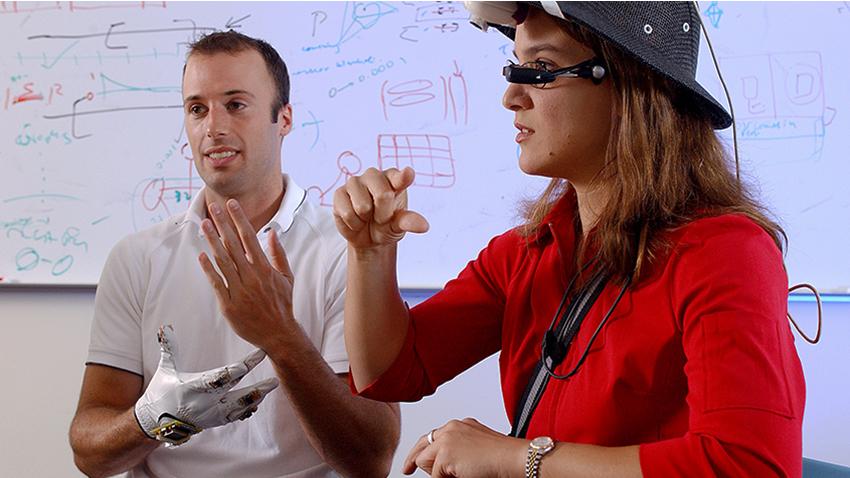
Ph.D. in Human-Centered Computing
Learn more:
- Cutting-Edge Research
- World-Class Faculty
- Current Ph.D. Students
The HCC Ph.D. program meets industrial and societal needs for education and research in humanizing computer technology, while attracting the best and brightest from around the world. As a result, HCC graduates are exceptionally well prepared for careers in both academia and industry.
Admission + Program Requirements
Thanks for your interest in the Human-Centered Computing (HCC) Ph.D. program. The application deadline each year is December 15 and students are only admitted during the fall semester. We do not require GREs from HCC PhD applicants.
Complete the online application.
Qualifying Exam
All HCC Ph.D. students are required to take a qualifying exam. The purpose of the qualifying exam is for the student to demonstrate competency in:
-
Basic computing concepts and methods
-
Written research communication
-
Oral research communication
-
Core HCC knowledge
-
Core knowledge in student’s HCC specialization.
-
Design and evaluation of human-centered systems
-
Synthesis of ideas from different fields, such as from computing and cognitive, educational, and social sciences
Parts of the Exam
The qualifying exam consists of three parts:
- Written Exam
- Oral Exam
- Research Portfolio (demonstrates the skills enumerated below, and includes at least one publication quality paper)
The HCC qualifying exam is administered in the spring term of each academic year and all students are expected to take it in their second year. Students that need accommodations must contact the Office of Disabilities Services. The exam is administered by a faculty committee selected by the advisor in consultation with the student. It consists of the student’s advisor(s) and three additional HCC faculty members. The HCC faculty will evaluate the written component of the qualifying exam and will decide whether or not the student is invited to complete the oral component. A student may retake a failed exam once and all students must pass within three years of entering the program.
After a second attempt of the written component of the qualifying exam, the HCC faculty will decide whether or not the student is invited to complete the oral component. A student who fails the second qualifying exam will be asked to leave the program. The collective decision of the faculty is final.
Thesis Proposal Defense and Dissertation Defense
Georgia Tech requires that "Doctoral students must spend at least two full-time semesters in residence at the Georgia Institute of Technology and ordinarily must complete research for the dissertation while in residence" (Georgia Tech 2014-15 General Catalog).
- Thesis Proposal Defense - All students need to present and defend a written Ph.D. proposal to a thesis proposal committee of at least four members as follows:
- The student’s advisor(s)
- At least two additional HCC faculty members
- At least one other faculty from another academic unit in Georgia Tech (outside HCC, typically the minor field) or a committee member external to Georgia Tech
All committee members must have a Ph.D. degree. Committee members external to Georgia Tech need not be affiliated with a university.
We expect all students to defend their thesis proposal by the end of the fourth year of their Ph.D. program. After the proposal is accepted, the student is expected to initiate a meeting with the thesis committee at least once a year to review research progress.
When completed, the dissertation must be publicly defended before a dissertation committee of at least five members (in addition to the four above, at least one committee member must be external to Georgia Tech). Please see Georgia Tech Guidelines for thesis proposals.
Application Requirements
- Georgia Tech Online Application
- Three Letters of Recommendation (preferably from academics)
- Examples of HCC research
Explore and learn more about the program's core classes, research and more on the HCC Ph.D. Program of Study page.
Learn about our program of study
Research & Labs
Research is the most important part of the HCC Ph.D. and often varies quite a lot from student to student and advisor to advisor. In general, we encourage all HCC Ph.D. students to get involved in research in their first term and we expect each student’s research to result in publications throughout the duration of their program.
Discover our labs and research
Teaching and Service
All Ph.D. students are required to serve as teaching assistants twice during the duration of their program. Further, we expect all of our students to be active participants in the program including performing community service, which may include organizing seminars, helping with the Ph.D. student recruiting, helping with the HCC program website, etc.